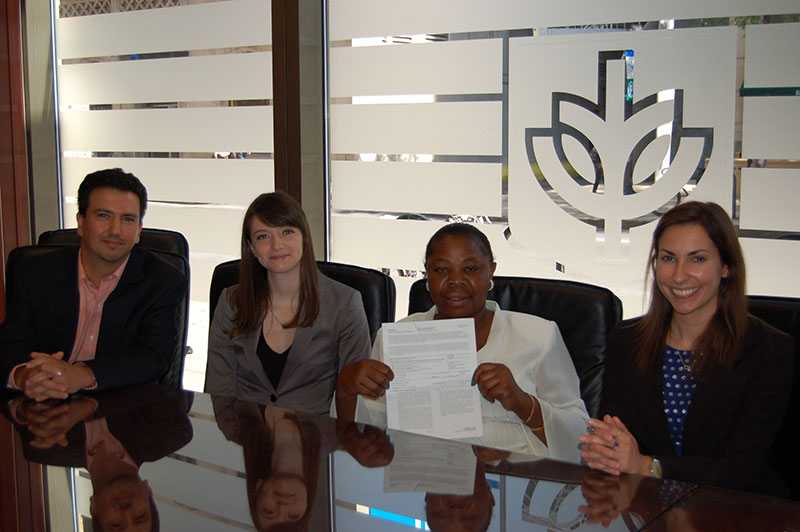 The Poverty Law Clinic team takes a moment to celebrate a successful outcome with their client. From left: Visiting Assistant Professor David Rodriguez, student Erin Grotheer (JD '13), clinic client Marie P. holding her section 8 voucher, and student Sarah Hunter (JD '14).
The Poverty Law Clinic team takes a moment to celebrate a successful outcome with their client. From left: Visiting Assistant Professor David Rodriguez, student Erin Grotheer (JD '13), clinic client Marie P. holding her section 8 voucher, and student Sarah Hunter (JD '14).Marie P. came to the DePaul Poverty Law Clinic in January 2013 seeking help in connection with the Chicago Housing Authority’s decision to terminate her from the Chicago Housing Choice Voucher Program (the “Section 8” program) because her landlord accused Marie of having an unauthorized person and dog living with her.
The Poverty Law Clinic interviewed Marie, Marie’s sisters and Marie’s close friend, and learned that the person who was temporarily staying with Marie was her ailing mother who had come to Chicago from Florida in order to be closer to her children and to have her children help take care of her as she had recently suffered the loss of her leg. The dog, it was learned, was her mother’s dog which stayed at Marie’s apartment for a week before Marie relocated the dog to her daughter’s home. After conducting its due diligence, the clinic accepted the case for representation and three students, Sarah Hunter, Richard Halm and Erin Grotheer, were assigned to work with Visiting Assistant Professor David Rodriguez on the case.
The team went to work identifying the legal issues that the administrative law judge would focus on and then developed a plan to secure supportive evidence, including documents from the hospitals that treated Marie’s mother before she passed away in June 2012 and interviews with family members and friends who could credibly corroborate Marie’s account of who was staying with her and why.
At the hearing in May 2013, Marie and her legal team discredited the CHA’s allegations by discrediting the landlord, who under cross examination admitted that he had no personal knowledge that anyone was living with Marie and admitted that it was possible that the person who he believed was living with Marie was in fact only visiting her. Marie testified on direct examination that her mother had stayed with her temporarily, but that she had not stayed 30 continuous days or more than 90 days in a calendar year, which would have made Marie’s mother a “resident” under HUD regulations and CHA rules. The team supported this testimony with documentation from the hospitals showing that Marie’s mother spent so many days at local hospitals before passing away that it was impossible for her to have been a resident under the applicable laws. The team then elicited testimony from Marie admitting to the presence of her mother’s dog, but credibly testifying that the dog was only present for a few days, thus allowing her team to argue that while she had technically violated her lease by having a dog in her unit, that the violation was not material and that she had cured any such problem within 10 days as allowed under the Chicago Residential Landlord Tenant Ordinance.The team concluded its case with an important theme: family members should be allowed, and encouraged, to care for one another in times of need, and that a landlord, like the landlord here, should engage in considerably more due diligence before making unsubstantiated allegations that jeopardize a person’s housing subsidy. The CHA administrative law judge agreed with Marie, concluding that the CHA failed to prove that Marie had materially violated her lease and the rules of the Section 8 program. The judge reinstated Marie to the Chicago Housing Choice Voucher Program and on July 25, 2013, Marie picked up her new voucher from the Chicago Housing Authority, which she intends to use to rent a home near her sisters. Marie thanked everyone at the DePaul Legal Clinic and DePaul College of Law for providing valuable services to people like her facing not only the loss of housing, but also the trickle down chaos that can ensue when a family member suddenly loses a home.
In the first half of 2013, the Poverty Law Clinic helped five other families avoid this chaos by saving their housing subsidies from wrongful termination. The clinic looks forward to keeping this pace in the second half of 2013.